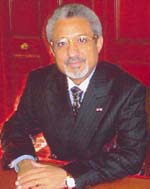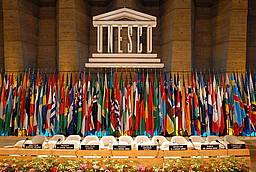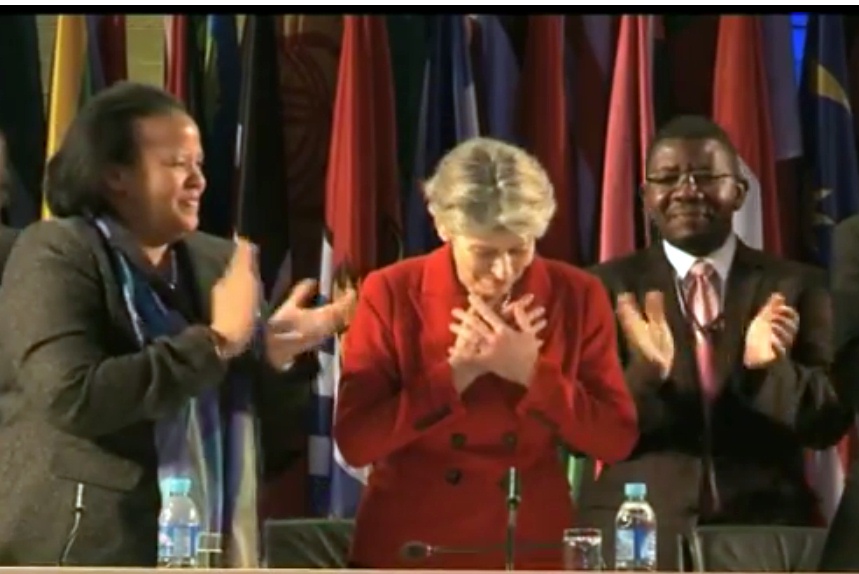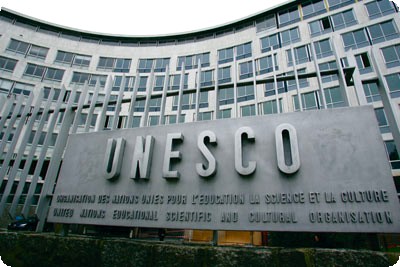
The material from Jeune Afrique mentioned in my last post is now available online. It provides a good introduction to the candidates and the race:
- Unesco: le batalle de Fontenoy fait rage
- Irina Bokova : à l’Unesco, “nous ne sommes pas un ministère français”
- Rachad Farah : “L’Unesco a perdu de sa prestance”
- Joseph Maila : UNESCO. ‘un centre grande d’expertise dynamique, pas un muse !”
I have created a post on my personal blog: Criteria for the Election of the UNESCO Director General. It suggests that the successes that UNESCO has achieved in the past imply that its leader is not simply the CEO of a bureaucracy, but the leader of a global movement.
“Batalla por la sucesión de Irina Bokova al frente de la UNESCO” suggests that Irina Bokova and Rachad Farah are the leaders in a heated race, but that anything can happen in the actual voting.
This article (“America Must Safeguard Its Essential Interests At UNESCO”) by a UNESCO Special Envoy is primarily intended to encourage the U.S. government to restore funding to UNESCO, but also supports the candidacy of Irina Bokova indirectly.
”Unesco: le temps de l’Afrique” provides a critique of UNESCO’s recent work and supports the candidacy of Rachad Farah. Farah continues to draw media attention:
- Candidat au poste de directeur général de l’UNESCO / Le Djiboutien Rachad Farah : ‘‘En finir avec la diplomatie de la paresse et les bricolages’’
- Rachad Farah : le candidat africain à la direction générale de l’UNESCO
As does Joseph Maila: “Joseph Maïla créera-t-il la surprise vendredi à l’Unesco ?”
I will quote here some recent evaluation findings, which may have importance in the election in light of the negative external audit by the French governmental audit agency of the management of UNESCO’s budgetary and financial crisis (Part II of this PDF file).
- A 2013 evaluation by the government of the United Kingdom summarized its findings: “Improvements made in work planning, budgeting, HR policies, transparency and cost control, which have strengthened organisational effectiveness. Will need to keep up pace of change to consolidate work done.”
- The Swedish government in 2012 assessed UNESCO as having a good level of internal and external effectiveness and recognized and appreciated the leadership Director General Bokova had shown in the reforms.
- In March 2012 the Australian government found UNESCO less than satisfactory in delivering results, strategic management and performance, and cost and value consciousness.
UNESCO has provided this report on the way it has dealt with its financial crisis.
The decision to debate U.S. spying in the Executive Board may further complicate the decision by the U.S. government on withholding or restoring its funding for UNESCO.
Here are links to previous Global Memo posts on the UNESCO election:
- More on the Election of the UNESCO Director General
- The 2009 Election of the UNESCO Director General<
- Election of the UNESCO Director General
- Background: the Election of the UNESCO Director General
- Third Candidate for UNESCO Chief
- Farah endorsed for UNESCO DG at African-South American Summit
- Rachad Farah’s UNESCO candidacy gains support
- More on the 2013 UNESCO DG Election
- New Election of UNESCO Director General in 2013







